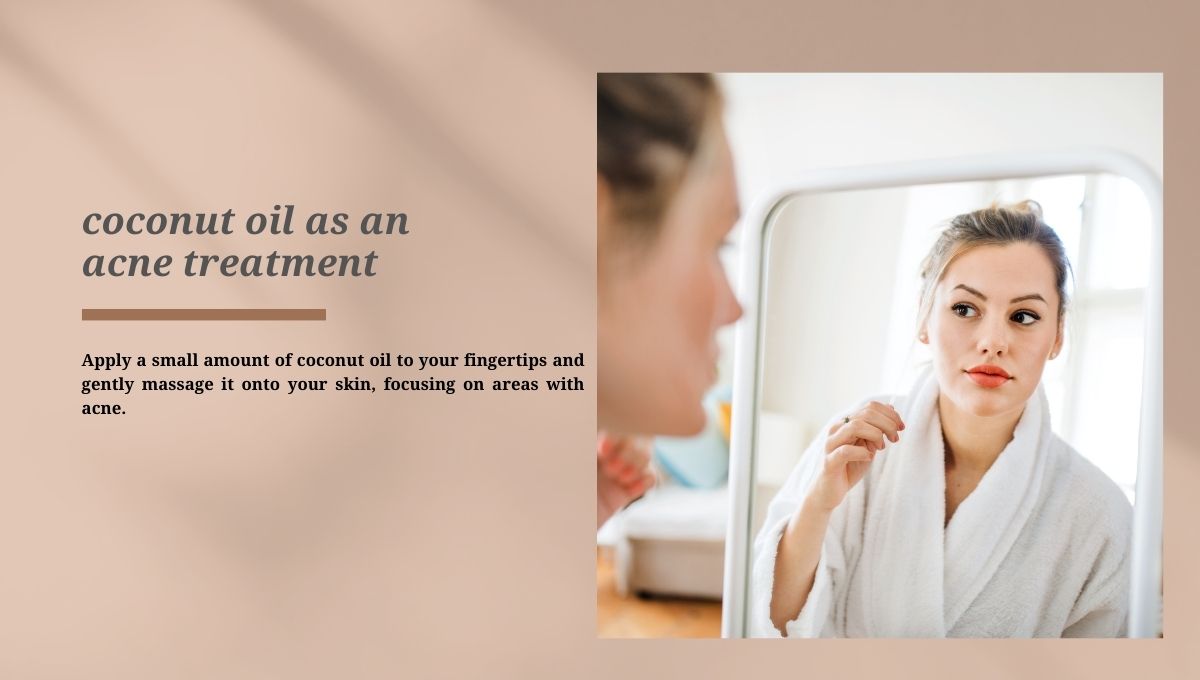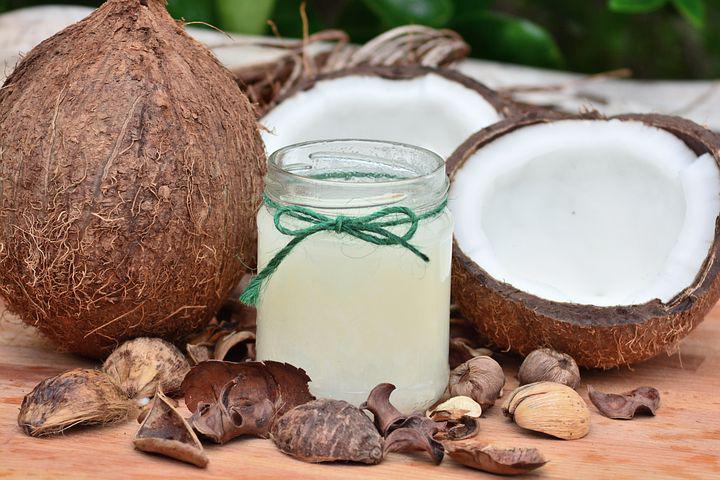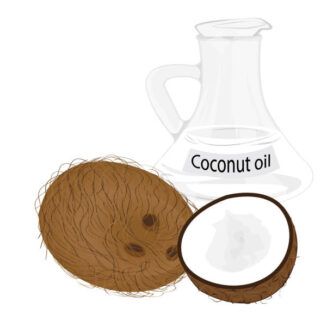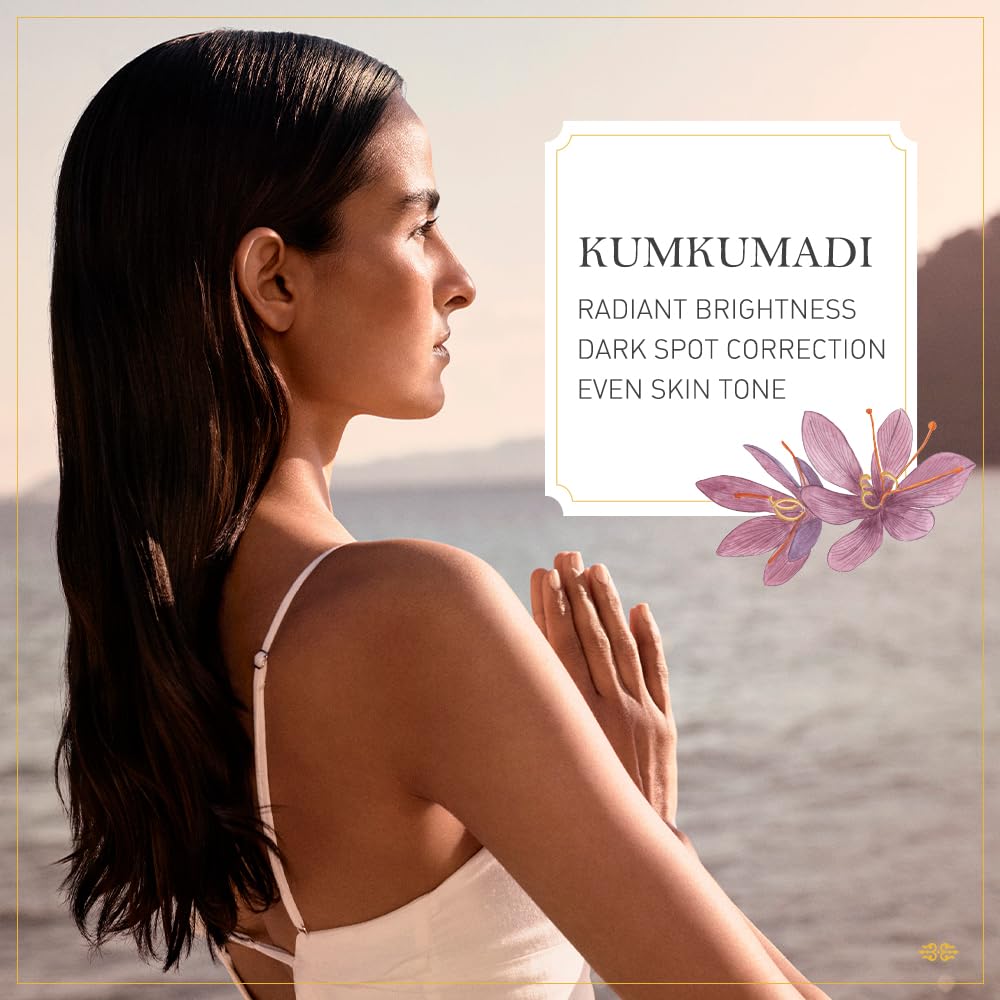COCONUT OIL FOR ACNE Coconut oil has been touted as a natural remedy for a variety of skin conditions, including acne. However, the scientific evidence for its effectiveness is mixed. Some studies have found that coconut oil can help reduce inflammation and improve hydration in the skin, which may help to clear up pimples.
However, other research suggests that coconut oil may exacerbate acne, especially for people with oily or acne-prone skin. Additionally, coconut oil is comedogenic which means it can clog your pores and cause more breakouts.
It’s important to note that everyone’s skin is different and what works for one person may not work for another. It’s always recommended to do a patch test before applying any new product to the face.
If you are going to use coconut oil on your face, use it sparingly and be sure to remove it thoroughly. It’s always best to consult a dermatologist to know if it’s suitable for your skin type and how you can use it.
What causes acne?
Acne is caused by a combination of factors, including hormonal changes, genetics, and the buildup of bacteria and oils in the pores. Hormonal fluctuations, such as those that occur during puberty or pregnancy, can cause an increase in oil production in the skin, which can lead to clogged pores and the formation of acne.
Genetics also play a role in the development of acne, as some people are more susceptible to the condition. Additionally, bacteria on the skin, particularly Propionibacterium acnes, can thrive in oily environments and contribute to the development of acne.
Is Coconut Oil a good acne treatment?
- Coconut oil has been used as a natural remedy for acne for many years, but its effectiveness is still a topic of debate. Some people believe that coconut oil can be beneficial for acne-prone skin because it has antimicrobial properties, which can help to reduce the number of bacteria on the skin.
- Additionally, coconut oil is a good source of fatty acids, which can help moisturize the skin and reduce inflammation.
- On the other hand, Coconut oil is comedogenic which means it can clog pores and cause acne, so if you have oily skin, it’s best to avoid it. People with oily skin should use non-comedogenic products, which are less likely to clog pores and cause acne.
- It is worth mentioning that everyone’s skin is different, so what works for one person may not work for another.
- It’s always a good idea to patch-test a small area of skin before using any new product, including coconut oil, to see if it causes any irritation or breakouts. If you have severe or persistent acne, it’s best to consult a dermatologist for professional advice and treatment.
What benefits of coconut oil on the skin?
- Moisturizing: Coconut oil is a natural emollient, which means it helps to keep the skin hydrated and soft.
- Anti-inflammatory: Due to its high content of lauric acid, coconut oil has anti-inflammatory properties, which can help to reduce redness and irritation associated with certain skin conditions, such as eczema and psoriasis.
- Antimicrobial: Coconut oil has antimicrobial properties, which can help c
- to reduce the number of bacteria on the skin and prevent infections.
- Anti-ageing: Coconut oil is rich in antioxidants, which can help to protect the skin from damage caused by free radicals and may help to reduce the appearance of fine lines and wrinkles.
- Sun Protection: Coconut oil has natural sunscreen properties which provide minimal protection against sun rays, but it is not recommended to use it as a sole sun protection method.
It is worth mentioning that while coconut oil may have some benefits for the skin, it is not suitable for all skin types, particularly oily and acne-prone skin. It’s always a good idea to patch-test a small area of skin before using any new product, including coconut oil, to see if it causes any irritation or breakouts.
Who should try coconut oil on the Face?
- Coconut oil can be beneficial for some skin types, but it may not be suitable for everyone.
- It is generally recommended for people with dry, mature, or sensitive skin. Coconut oil is a natural emollient and can help to hydrate the skin and reduce dryness, flakiness, and itching. It can also be beneficial for people with eczema and psoriasis, as it has anti-inflammatory properties that can help to reduce redness and irritation.
- However, people with oily or acne-prone skin should avoid using coconut oil on their face as it is comedogenic, which means it can clog pores and exacerbate existing acne. Instead, they should opt for non-comedogenic products that are less likely to clog pores and cause breakouts.
- It is important to keep in mind that everyone’s skin is different, and what works for one person may not work for another. It’s always a good idea to patch-test a small area of skin before using any new product, including coconut oil, to see if it causes any irritation or breakouts. If you have severe or persistent acne, it’s best to consult a dermatologist for professional advice and treatment.
Why does coconut oil cause acne breakouts?
- Coconut oil is a comedogenic substance, which means it can clog pores and cause acne breakouts. When applied to the skin, coconut oil can penetrate the pores and form a barrier on the skin’s surface.
- This barrier can trap dead skin cells, bacteria, and oils inside the pores, which can lead to clogging and the formation of acne. The comedogenic rating of coconut oil is 4 out of 5, which means it has a moderate to high chance of clogging pores.
- Additionally, coconut oil is high in saturated fats, which can contribute to the formation of acne by increasing sebum production. Sebum is an oily substance produced by the skin’s sebaceous glands, which can clog pores and provide a breeding ground for acne-causing bacteria.
- It is worth mentioning that not all people will develop acne when using coconut oil on their skin. However, those with oily or acne-prone skin should avoid using coconut oil on their face and instead opt for non-comedogenic products that are less likely to clog pores and cause breakouts.
How exactly does coconut oil help with acne?
- Coconut oil is not recommended as a treatment for acne, as it is a comedogenic substance that can clog pores and cause breakouts.
- However, some people may find that coconut oil can help to reduce the appearance of acne when used in small amounts, or when combined with other ingredients.
- One of the properties that could help with acne is its antimicrobial properties, which can help to reduce the number of bacteria on the skin. This is particularly true for the bacteria known as Propionibacterium acnes which is known to contribute to the development of acne.
- Another benefit is the presence of lauric acid, a fatty acid found in coconut oil that has anti-inflammatory properties. These properties can help to reduce redness and inflammation associated with acne.
- It is worth noting that these benefits are not scientifically proven and more research is needed to determine the effectiveness of coconut oil as an acne treatment. Also, it is important to keep in mind that everyone’s skin is different, and what works for one person may not work for another.
Does skin absorb coconut oil?
- Yes, the skin can absorb coconut oil. Coconut oil is composed of medium-chain fatty acids, which are easily absorbed by the skin. When applied topically, coconut oil can penetrate the skin’s surface and be absorbed into the deeper layers of the skin, where it can provide moisturizing and other benefits.
- However, it is also worth mentioning that the amount of coconut oil that is absorbed by the skin can vary depending on the individual’s skin type, the condition of the skin, and the amount of oil used. Some people may find that their skin absorbs coconut oil quickly, while others may find that it sits on top of the skin and forms a barrier.
- It is important to note that when using coconut oil on your skin, it is best to use a small amount and test it on a small area of skin first to see how your skin reacts. If you have oily or acne-prone skin, it’s best to avoid using coconut oil on your face and instead opt for non-comedogenic products that are less likely to clog pores and cause breakouts.
Leave overnight if you have dry skin
- If you have dry skin, leaving coconut oil on your skin overnight can be beneficial as it can provide intense hydration while you sleep. When used as a nighttime moisturizer, coconut oil can help to lock in moisture and provide a barrier against environmental stressors.
- However, it is important to keep in mind that some people may find that coconut oil is too heavy for their skin, and it may cause irritation or clog pores. It is always a good idea to patch-test a small area of skin before using any new product, including coconut oil, to see if it causes any irritation or breakouts.
- If you have oily or acne-prone skin, it’s best to avoid using coconut oil as a leave-on treatment and instead opt for non-comedogenic products that are less likely to clog pores and cause breakouts. In this case, it is best to use coconut oil as a cleanser or massage oil for a short period, then rinse it off.
- If you have dry skin and you want to use coconut oil as a nighttime moisturizer, it is best to use a small amount and apply it to your skin after your regular skincare routine.
Choose organic virgin coconut oil
- Organic virgin coconut oil is a good choice because it is made from the meat of fresh coconuts and is not treated with any chemicals or pesticides.
- It is also unrefined, which means it has not been processed and retains its natural nutrients and flavour.
- Virgin coconut oil is also rich in lauric acid, which has been shown to have potential health benefits. Additionally, organic certification ensures that the oil has been produced without the use of synthetic pesticides and fertilizers.
You may Also Like- How To Use Neem For Acne Removal – Unlock The Incredible Benefits
The best way to use coconut oil to treat acne
Coconut oil has antimicrobial properties that may help to reduce the bacteria that cause acne. To use coconut oil to treat acne, you can try the following:
- Cleanse your face with a gentle cleanser and pat dry.
- Apply a small amount of coconut oil to your fingertips and gently massage it onto your skin, focusing on areas with acne.
- Leave the coconut oil on your skin for at least 15-20 minutes or overnight.
- Rinse your face with lukewarm water and pat dry.
It’s important to note that some people may be allergic to coconut oil, so it’s always best to do a patch test before applying it to your face. Also, coconut oil is comedogenic which means it could clog your pores. So, If you have oily skin, it’s best to avoid using coconut oil or use it in moderation.
Can coconut oil really help with acne?
However, it’s important to note that the effectiveness of coconut oil can vary from person to person. Some people may find it very helpful, while others may experience worsened acne or skin congestion. It’s crucial to do a patch test before applying coconut oil to your face to ensure it doesn’t irritate your skin.
If you decide to use coconut oil for acne, choose a high-quality, organic, and unrefined coconut oil.
How should I use coconut oil to treat acne?
Patch Test: Apply a small amount of coconut oil to a small area of your skin to check for any adverse reactions. If you experience redness, itching, or irritation, do not use it on your face.
Cleansing: Before applying coconut oil, cleanse your face with a gentle, acne-friendly cleanser to remove dirt and makeup.
Application: Apply a small amount of coconut oil to your acne-prone areas, gently massaging it into your skin using clean hands. You can leave it on as a moisturizer, or you can use it as an overnight treatment.
Consistency: Be consistent in your application, but do not overuse it. Using too much coconut oil can lead to clogged pores, which may worsen your acne.
Sun Protection: If you’re using coconut oil during the day, follow up with a broad-spectrum sunscreen, as some people may find that coconut oil can make their skin more sun-sensitive.
Remember that while coconut oil works for some, it might not be suitable for everyone. Always listen to your skin’s response and consult a dermatologist if you have concerns.
Can coconut oil be used as a spot treatment for acne?
However, be cautious when using coconut oil as a spot treatment, as it can be comedogenic for some individuals, meaning it may clog pores and cause more breakouts. It’s a good practice to use it sparingly and only in the areas that need treatment.
If you find that coconut oil doesn’t work well for your skin or if it worsens your acne, consider alternative treatments or consult a dermatologist for personalized advice on managing your acne.
Always remember that what works for one person may not work for another when it comes to skincare, and it’s essential to choose products and routines that best suit your unique skin type and needs.










